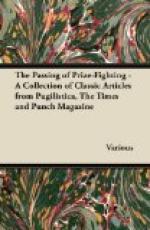In order to secure that general style and bearing for which Foreign Affairs are so remarkable, the mind must be carefully divested of divers incompatible qualities—such as self-respect, the sense of shame, the reverential instinct, and that of conscience, as certain feelings are termed. It must also be relieved of any inconvenient weight of knowledge under which it may labour; though these directions are perhaps needless, as those who have any inclination to form themselves after the pattern of Foreign Affairs, are not very likely to have any such moral or intellectual disqualifications to get rid of. However, it would only be necessary to become conversant with the Affairs themselves, in order, if requisite, to remove all difficulties of the sort. “There is a thing,” reader, “which thou hast often heard of, and it is known to many in our land by the name of pitch;” we need not finish the quotation.
To defend the preceding observations from misconstruction, we will make, in conclusion, one additional remark; Foreign Affairs are one thing—Foreign Gentlemen another.
* * * * *
PUNCH’S PENCILLINGS—No. IV.
[Illustration: FOREIGN AFFAIRS by (a drawing of an ink bottle)]
* * * * *
THE MINTO-HOUSE MANIFESTO
Some of our big mothers of the broad-sheet have expressed their surprise that Lord John Russell should have penned so long an address to the citizens of London, only the day before his wedding. For ourselves, we think, it would have augured a far worse compliment to Lady John had he written it the day after. These gentlemen very properly look upon marriage as a most awful ceremony, and would, therefore, indirectly compliment the nerve of a statesman who pens a political manifesto with the torch of Hymen in his eyes, and the whole house odorous of wedding-cake. In the like manner have we known the last signature of an unfortunate gentleman, about to undergo a great public and private change, eulogized for the firmness and clearness of its letters, with the perfect mastery of the supplementary flourish. However, what is written is written; whether penned to the rustling of bridesmaids’ satins, or the surplice of the consolatory ordinary—whether to the anticipated music of a marriage peal, or to the more solemn accompaniment of the bell of St. Sepulchre’s.
Ha! Lord John, had you only spoken out a little year ago—had you only told her Majesty’s Commons what you told the Livery of London—then, at this moment, you had been no moribund minister—then had Sir Robert Peel been as far from St. James’s as he has ever been from Chatham. But so it is: the Whig Ministry, like martyr Trappists, have died rather than open their mouths. They would not hear the counsel of their friends, and they refused to speak out to their enemies. They retire from office with, at least, this distinction—they are henceforth honorary members of the Asylum for the Deaf and Dumb!




